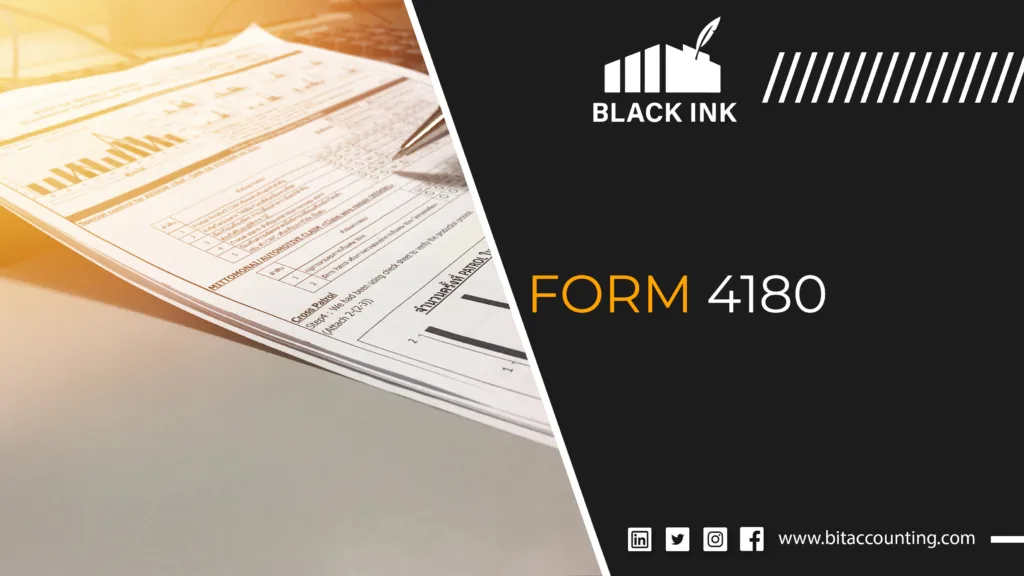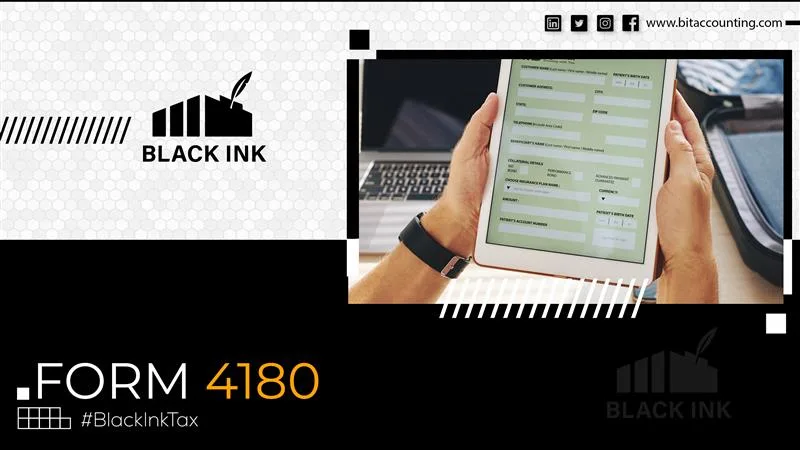
Table of Contents
Form 4180: Everything You Need To Know About TFRP Interview
The Form 4180 interview is part of the IRS’s process for identifying a responsible individual for unpaid payroll taxes. The purpose of the IRS interview is to determine whether or not the Internal Revenue Service is going to assess a trust fund recovery penalty against you.
In this blog, we will explore the TFRP mean, understanding Form 1480, its purpose, what happened during the interview, and how to avoid it.
What Does the Trust Fund Recovery Penalty Mean?
At BIT Accounting, we frequently get queries about the complexity of the trust fund recovery penalty form and interview. The tax relief may seem confusing and hard to understand. Therefore, we believe it is necessary to provide our clients with proper information that can help them through this complex process.
The TFRP refers to an IRS program identifying a responsible individual within the firm who fails to forward payroll taxes.
Objective of TFRP
There are two major objectives of the trust fund recovery penalty program:
- Identification of the responsible people
- Penalized actions under employment law against those who are responsible.
Understanding IRS Form 4180: An Overview
Are you seeking to determine whether you’re a responsible person or you’re not? Let’s understand what IRS Form 4180 is and how it is associated with your trust fund accountabilities.
IRS Form 4180, also known as “Report of Interview with Individual Relative to TFRP.” It plays a crucial role in clarifying confusion surrounding the establishment of fault regarding unpaid payroll taxes.
As you complete it correctly and on time, IRS Form 4180 can help you in protecting your personal assets from potential penalties due and clear any misunderstandings with the IRS.
Purpose of an IRS Form 4180 Interview
The purpose of an IRS Form 4180 interview is to identify who is responsible. The IRS’s agents try their best to identify if you are responsible or not, but it’s not just you whom they are inquiring about; they are looking for other responsible people in your organization.
All in all, you can say that the interview is the process that uncovers the real responsible person to assess the Trust Fund Recovery Penalty (TFRP). Once you are on their radar, they send you Form 1153, and you have 60 days before appearing for an interview.
Let’s explore what will happen at the Form 4180 interview.
What Happens at a Form 4180 Interview
The Form 4180 interview can be conducted either face-to-face or over the phone. The interviewer starts the conversation with a series of general questions about your personal details, such as your name, Social Security Number, contact number, and address.
Then, the interviewer begins asking professional questions, such as your job title or your relationship with the business. As mentioned before, agents are trying to uncover the person responsible for not paying the trust fund taxes, aka FICA taxes.
Are you the person the IRS summoned for the interview? Then be prepared for what comes next.

What Questions May You Face During an Interview?
You can be prepared before the IRS calls you. Here is the series of questions that the interviewer may ask you:
- Are you responsible for setting financial policy for the company?
- Do you authorize payments for bills or creditors?
- Do you sign or send payroll returns? (Those are the quarterly returns you send to the IRS with the company’s payroll information.)
- Do you make payroll payments?
- Do you authorize payroll payments?
- Did you know the taxes weren’t being paid?
- Are you involved in the company’s electronic banking?
The IRS agent may ask more edgy questions, such as your login information, PINs for cards, and even authorization to sign checks for firms. These questions help them determine your position in the company’s financial matters.
How To Avoid The 4180 Interview
The following are a few tips to avoid the 4180 interview:
Avoid The 4180 Interview If You Are Liable
The best way to get out of a 4180 interview when you are liable is to pay the bill and cancel the interview. You can also sign Form 2751 (Proposed Assessment of Trust Fund Recovery Penalty) and, after that, attempt to set up payment.
Avoid The 4180 Interview If You Are Not Liable
If you are not accountable for the payment, you may challenge your liability. This can be extremely tough, so consult with a tax attorney or an experienced lawyer. Do not hire just any attorney. You’ll need someone who has experience with this particular issue. The lawyer must demonstrate that you were not accountable for the underpaid tax, even if you were involved in the company’s finances.
If you unintentionally signed Form 2751 but are not legally liable, a lawyer can assist you. That professional may say that you were intimidated into signing the document. In such circumstances, a lawyer may allege that the other employees conspired against you.
Avoid The 4180 Interview If You Don’t Have Any Money
The IRS is not into chasing rainbows. If the agency feels you will be unable to pay the debt, it will seek alternative funding. To demonstrate to the IRS that you do not have any money, complete Form 433A.
This is the same form that you use when you seek a settlement of personal tax liabilities. To complete it, you must provide a variety of personal financial information. You also require a large number of backup documents.
Keep in mind that uncollectibility is difficult to prove. You could feel broke, but the IRS may disagree. The agency has no problem seizing your personal property or garnishing your wages as necessary.
What Happened After the Form 4180 Interview?
What happens once you’ve finished your Form 4180 submission within the time frame specified by IRS guidelines?
The wait continues! However, it is less about sitting idle and more about preparing for the probable consequences of the answers presented therein.
After verifying all provided information through their in-house system, as well as cross-referencing inputs extracted from internal sources such as bank statements or financial records, the IRS painstakingly examines whether the designated responsible person(s) consciously defaulted on the withheld employment tax non-payment list before deciding on a penalty course of action.
Conclusion
It can be hard to deal with the IRS Form 4180 interview, especially if the Trust Fund Recovery Penalty (TFRP) is at stake. This isn’t simply a normal tax form; it’s the IRS’s means of figuring out if you owe payroll taxes.
If you know what to expect, how to answer the IRS’s questions, and when to get professional aid, you can safeguard your reputation and your money. If you aren’t responsible, be sure you have the proof to show it. If you are at fault, think about settling the issue quickly to prevent harsher consequences. We at BIT Accounting think that taxpayers who know what they’re doing make the greatest choices. Don’t go through a Form 4180 interview or a TFRP assessment by yourself. Contact our knowledgeable tax experts for personalized help with your circumstance.
FAQs
1: What is IRS Form 4180 used for?
Form 4180 is used by the IRS to conduct interviews with individuals who may be responsible for unpaid payroll taxes. The form helps determine whether a person should be personally assessed the Trust Fund Recovery Penalty (TFRP).
2: Who is considered a “responsible person” in a TFRP case?
A “responsible person” is anyone in the business who has authority over financial decisions, such as signing checks, managing payroll, or controlling tax deposits. This can include business owners, officers, bookkeepers, and even HR managers.
3: Can the IRS interview more than one person for the same TFRP case?
Yes. The IRS often interviews multiple individuals within a company to determine who had control over payroll tax decisions. Form 4180 can be used for each person under review.
4: What happens if I ignore the Form 4180 interview request?
Ignoring the IRS interview request can lead to automatic assessment of the Trust Fund Recovery Penalty against you. It’s better to participate and clarify your role than to risk default liability.
5: Can I refuse to sign Form 4180 during the interview?
Yes, you can choose not to sign the form. However, the IRS can still use your statements from the interview as part of their investigation, and refusal may not stop them from assessing the penalty.
GET FREE QUOTE FOR ALL OF OUR SERVICES
Black Ink will send you a free analysis of your current state and what would be the cost of managing either a separate accounting and bookkeeping services or a complete solution across New York, USA. Do get in touch and we will be happy to consult you with our bookkeeping services in NY, New York, USA.
